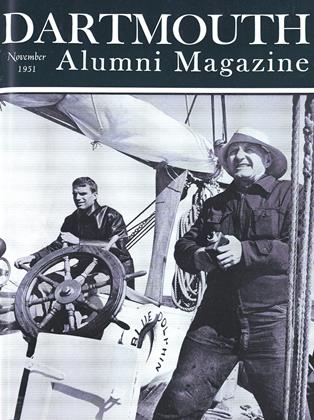1801-1829 byLeonard D. White, '14. Macmillan, 1951,pp. XIV, 572, $6.00.
Three years ago Professor White published The Federalists, a brilliant pioneering first volume in the administrative history of the United States Government. The present study is a continuation of the story through the Jeffersonian Republican period, 1801-1929, and is quite as rewarding as the earlier volumea definite contribution to our knowledge and understanding of the period.
In The Jeffersonians the author discusses the nature of the shift from Federalist to Jeffersonian administration, the strength and weakness of Jefferson as an administrator, the decline of presidential power under Madison, and the -trials of Monroe and Adams with the increasing assertiveness of Congress. Other chapters are devoted to the relations of the Jeffersonian presidents with their cabinet officers, the administrative history of the several government departments, and the administrative reforms which followed the War of 1812, some of which established procedures lasting into the twentieth century.
Attention is also given to the theory and practice of personnel administration under the Jeffersonians, to public service as a career, and to the public service ethics of the period. In this connection it is interesting to note the Jeffersonian reluctance to introduce the spoils system, as well as to the Jeffersonian, quite as much as the Federalist, belief that government was a matter for gentlemen.
In conclusion Professor White points out that the role of the Jeflcersonians in the field of administration was not that of innovation or creation, but rather "to direct an existing governmental mechanism towards the objectives that were imposed by their [own] views of public policy." The Jeffersonians, in fact, "carried the Federalist administrative machine forward without substantial alteration in form or in spirit for nearly three decades."
A study of administrative history such as this might well have been profitable but heavy reading, but The Jeffersonians, like its predecessor, is anything but dull. Excellent organization, apt illustrations, and interesting character sketches of the many striking personalities involved make for both rewarding and lively reading. For those interested in the history of the early Republic both TheFederalists and The Jeffersonians should be must reading.
 View Full Issue
View Full Issue
More From This Issue
-
 Class Notes
Class Notes1918
November 1951 By ERNEST H. EARLEY, DONALD L. BARR -
 Article
ArticleTHE COLLEGE
November 1951 By John Hurd '21 -
 Article
ArticleA Free Man Is Answerable
November 1951 By President Dickey -
 Article
ArticleTo the Top of McKinley
November 1951 By JERRY MORE 52. -
 Article
ArticleMore Bone and Sinew For a Growing College
November 1951 By NICHOL M. SANDOE '19 -
 Article
ArticleAmbrose White Vernon
November 1951 By DONALD BARTLETT '24
W. R. Waterman
-
 Books
BooksTHOMAS JEFFERSON. THE APOSTLE OF AMERICANISM.
FEBRUARY 1930 By W. R. Waterman -
 Books
BooksTHE GOLDEN STAR OF HALICH; A TALE OF THE RED LAND IN
NOVEMBER 1931 By W. R. Waterman -
 Books
BooksTHE MISSISQUOI LOYALISTS
October 1938 By W. R. Waterman -
 Books
BooksA SHORT HISTORY OF AMERICAN LIFE.
October 1952 By W. R. Waterman -
 Books
BooksTHE JACKSONIANS: A STUDY IN ADMINISTRATIVE HISTORY
December 1954 By W. R. WATERMAN -
 Books
BooksEASTWARD THE SEA.
JULY 1959 By W. R. WATERMAN
Books
-
 Books
BooksRICHARD HENRY DANA.
MARCH 1970 By CARL E. MAVES '63 -
 Books
BooksGREEK THOUGHT IN THE NEW TESTAMENT.
AUGUST, 1928 By Charles D. Adams -
 Books
BooksOMAN SINCE 1856, DISRUPTIVE MODERNIZATION IN A TRADITIONAL ARAB SOCIETY.
DECEMBER 1967 By CHRISTIAN P. POTHOLM II -
 Books
BooksYACHTING IN NORTH AMERICA.
March 1949 By Herbert F. West '22. -
 Books
BooksKAZANTZAKIS AND THE LINGUISTIC REVOL UTION IN GREEK LITERATURE.
JUNE 1973 By KATHERINE LEVER -
 Books
BooksTANSTAAFL: THE ECONOMIC STRATEGY FOR ENVIRONMENTAL CRISIS.
JULY 1971 By THOMAS B. ROOS


